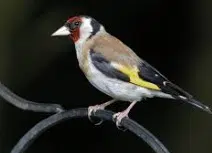Before entering fully into the meaning of the term goldfinch, we are going to proceed to know its etymological origin. In this case, we can emphasize that it is a word that derives from Latin, specifically from "silybum." This word, in turn, emanates from another Greek word that was used to refer to milk thistle.
The goldfinch is a bird : that is, a small bird . Like all birds, it is an oviparous and vertebrate animal that has two legs and a pair of wings and whose body is covered in feathers.
 Goldfinches are famous for their singing and can be easily tamed. They measure about 12 centimeters and their plumage is dark in the back area; white on the face with a red spot and a black spot on the top of the head; with a whitish collar; and black with white tips on the tail and wings, where it also has yellow feathers.
Goldfinches are famous for their singing and can be easily tamed. They measure about 12 centimeters and their plumage is dark in the back area; white on the face with a red spot and a black spot on the top of the head; with a whitish collar; and black with white tips on the tail and wings, where it also has yellow feathers.
Generally the concept refers to members of the genus Carduelis , although there are exceptions. The so-called common goldfinch , with the scientific name Carduelis carduelis , is very common on the European continent, in western Asia and in the northern part of Africa .
Thistle, wheat and sunflower seeds are the preferred food of goldfinches, which in some cases also ingest insects. These birds are partially migratory, moving during the day.
Other interesting facts about the goldfinch are the following:
-Their average lifespan is usually between 8 and 10 years.
-The indiscriminate hunting of goldfinches is not only leading to a notable decline in their numbers but has also led to the fact that in some countries it is not allowed to have goldfinches at home.
-Among the most common diseases suffered by this animal are enteritis, which usually occurs due to having ingested parasites through spoiled water or food, and colibacillosis, which occurs due to having consumed contaminated food. However, you can also suffer from cysts to worms and diphtheria, for example.
In the same way, we cannot ignore the existence of a singer who has gone down in history with the nickname "El Jilguero de Cienfuegos." This was none other than the Cuban Inocente Iznaga González (1930 – 2012) who stood out for interpreting the guajira music of his country in a very peculiar way and hence his nickname. That uniqueness that he had led him to obtain great recognition as well as a long list of awards throughout his career.
Jilguero , on the other hand, is the name of an Argentine river transport company that operates in the Paraná River delta , in the Buenos Aires district of Tigre . The company has collective boats that are used by tourists and residents of the islands in the area. Its terminal is located at the “Domingo Faustino Sarmiento” River Passenger Station , on the Tigre River .
«Jilguero» , finally, is a song by Luis Alberto Spinetta that is part of his album «Pelusón of milk» . The Argentine musician would have been inspired by the Sicalis flaveola pelzelni , a bird known as the golden goldfinch or Argentine goldfinch .
